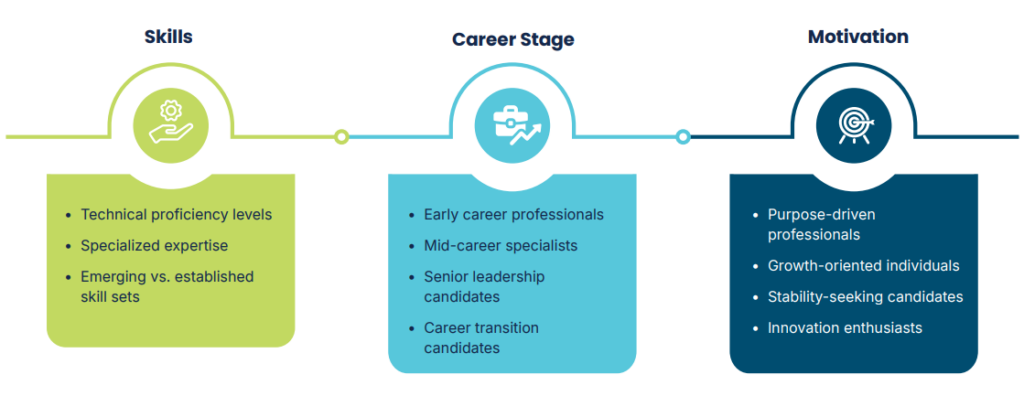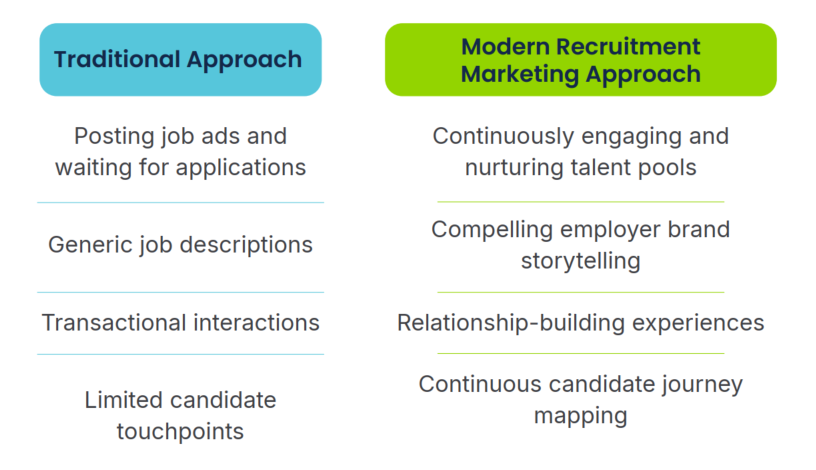Today’s most sought-after professionals aren’t just looking for a paycheck; they’re seeking purpose, growth and authentic connection with organizations that align with their values. This shift has given rise to content marketing in recruitment.
Just as consumers research brands extensively before making purchasing decisions, today’s candidates conduct deep research into potential employers before even considering an application. They’re consuming content across multiple touchpoints, forming impressions about your organization long before they interact with your recruitment team.
The most successful organizations have recognized this behavioral change and adapted accordingly. They’re creating comprehensive content ecosystems that educate, inspire and engage potential candidates throughout their entire talent journey. This is a strategic talent attraction approach that builds relationships, establishes trust and positions your organization as an employer of choice in a crowded marketplace.
Understanding the Candidate Journey: A Content-Driven Approach
Content has become the critical bridge between potential candidates and employers. It’s not just about broadcasting job openings, but about creating a comprehensive narrative that attracts, informs and inspires top talent. Think of your content strategy as a sophisticated conversation—one that begins long before a candidate submits an application and continues well into the recruitment process.
Awareness & Consideration Stages
In these early stages, potential candidates are just beginning to learn about your organization and are weighing what you have to offer. Your content should:
- Showcase your employer brand authentically
- Highlight organizational culture and values
- Provide insights into what makes your workplace unique
Use visually engaging, shareable content like:
- Employee-generated videos and other content testimonial videos
- Day-in-the-life videos and behind-the-scenes glimpses of workplace culture
- Infographics about company achievements and innovation
Interest Stage
As candidates become more interested, they seek deeper understanding. Content should:
- Offer more detailed insights into specific roles and teams
- Demonstrate career growth opportunities
- Share employee success stories
Provide resources like:
- Detailed team and department profiles
- Career development pathway illustrations
- Webinars and live Q&A sessions with current employees
Application, Selection & Hire Stages
In the later critical stages, candidates may be evaluating whether to apply, to move forward in the recruitment process or even to accept an offer. Your content should:
- Address potential concerns and questions
- Provide transparent information about the recruitment process and onboarding resources
- Showcase career pathways, development programs, mentorship programs, employee resource groups (ERGs) and more
Content should include:
- Detailed role descriptions
- Assessment and interview preparation guides
- Insights into company benefits, work/life balance and work environment
- Webinars, insights sessions and videos that bring the recruitment process to life and create connection with candidates
- Information to support those from diverse backgrounds offered in a variety of ways to meet their consumption preferences
Multichannel Recruitment Content Marketing
Multichannel recruitment marketing involves using a variety of channels to reach and engage with potential candidates, including social media, email, job boards and paid advertising, to improve candidate experience and increase the chances of finding the right talent. A multichannel strategy ensures that your content resonates across diverse platforms, reaching candidates through their preferred communication modes.
We’re choosing to focus on digital channels in this article, but many of these principles will apply to television, print media and physical advertising. If you’re interested in how we can help in these arenas, let’s connect.
Digital Channels:
- Career Site: A central hub for job postings and company information, including blog posts, articles, videos and more.
- Social Media: Platforms like LinkedIn, Facebook, Instagram, and others.
- Email Marketing: Targeted email campaigns to reach specific audiences.
- Job Boards: Online platforms where job openings are posted.
- Paid Advertising: Targeted recruitment advertising campaigns on social media, job boards and other platforms.
- Events: Digital and in-person industry events, career fairs, webinars, Q&A sessions and more.
Finding the Right Mix of Channels
Choosing the right channels is less about casting the widest net and more about precision targeting. Think of channel selection as carefully curating a conversation where your ideal candidates are most likely to be listening, engaged and receptive. Let your candidate personas be your guide.
Maintaining a Unified Employer Brand Voice
While platform strategies may differ, your core employer brand message must remain consistent. This doesn’t mean identical communication across all channels, but rather a harmonized narrative that adapts to each platform’s unique communication style.
On LinkedIn, your tone might be more formal and professional, focusing on career growth and industry expertise. On Instagram, the same core message could be communicated through vibrant, behind-the-scenes imagery that highlights workplace culture and human connections. The underlying story remains constant, but its expression is tailored.
Creating Seamless Cross-Platform Experiences
Modern candidates move fluidly between digital touchpoints. Your recruitment marketing strategy must mirror this fluidity. A potential candidate might first encounter your employer brand through a LinkedIn post, explore your career site, check employee reviews on Glassdoor, and then follow your company’s Instagram for cultural insights.
Each of these interactions should feel like part of a cohesive narrative. Consistency in visual branding, messaging tone and EVP creates a sense of reliability and professionalism that builds candidate trust.
Using Employee Advocates to Tell Your Brand Story
Effective content connects on a human level. Your current employees are your most powerful tool when it comes to recruitment marketing. An employee advocacy program is a great way to secure employee-generated content and create an emotional connection with candidates while delivering authenticity.
If you’re just starting out with your employee advocacy program, here are some tips to help you begin.
Embrace Storytelling Through Employee Experiences
One of the most effective ways to manage perception and shift views is through authentic storytelling. Showcase real-life employee experiences, achievements and testimonials to highlight the positive aspects of your workplace. You can use a variety of content formats like videos, podcasts, blogs and social media posts. Ensure employee-generated content is coming from a diverse group to create inclusion and representation. This approach humanizes your brand and makes it easier for potential employees to imagine themselves at your company.
Promote Your Thought Leaders
Create and share thought-provoking content on industry trends, company values or insights on your work culture. This can position your brand as a leader and innovator in your industry. Feature your employees as subject matter experts, giving them a platform to share their knowledge and experiences. This not only enhances your company’s credibility but also provides an opportunity for your employees to build their personal brands, boosting their engagement and loyalty.
Incentivize Participation
Incentivize everyone to participate in their own unique ways. Some of your employer brand advocates will excel at social media content creation, while others will thrive representing your company as a conference speaker or through podcast opportunities, for example. Rewarding participation is a smart way to build momentum, especially when rewards can be redeemed against holidays, events, training, swag or other perks.
Measuring Success of Content Marketing in Recruitment
The true measure of content marketing success in talent attraction extends far beyond traditional metrics like views or likes. Leading organizations track engagement quality, candidate journey progression, and the correlation between content consumption and application quality. They monitor which content pieces drive the most qualified candidates, which formats resonate with different talent segments, and how content engagement translates to offer acceptance rates.
More sophisticated measurement approaches include tracking content’s impact on employer brand perception, candidate experience scores, and long-term talent pipeline development. By understanding which stories resonate most powerfully with your target personas, you can continuously refine your content strategy to attract increasingly aligned candidates.
The Competitive Advantage of Authentic Recruitment Content Marketing
In an era of increasing skepticism toward corporate messaging, authenticity has become your greatest differentiator. Organizations that successfully leverage employee voices, share genuine stories, and provide transparent insights into their culture don’t just attract more candidates—they attract better-aligned candidates who are more likely to succeed and stay.
Content marketing in recruitment isn’t just about keeping up with changing candidate expectations; it’s about gaining a sustainable competitive advantage. While your competitors are still relying on job postings and recruiter outreach, recruitment content marketing helps build talent communities, nurture passive candidates and position your organization as a destination of choice regardless of whether you have specific openings to fill.
Content is more than a marketing tactic—it’s the foundation of modern recruitment that reflects your organization’s identity, values and vision. By creating authentic, engaging and culturally intelligent content, you transform recruitment into a meaningful dialogue that attracts exceptional talent and builds the foundation for long-term talent acquisition success.



